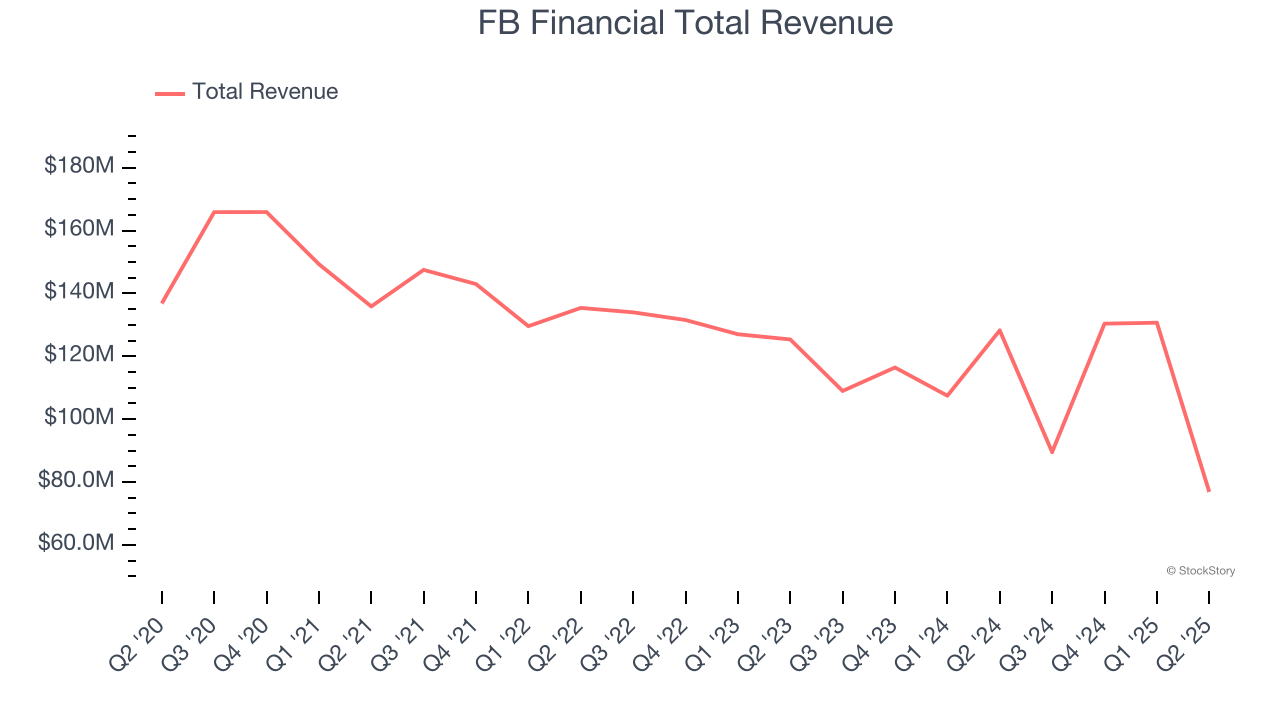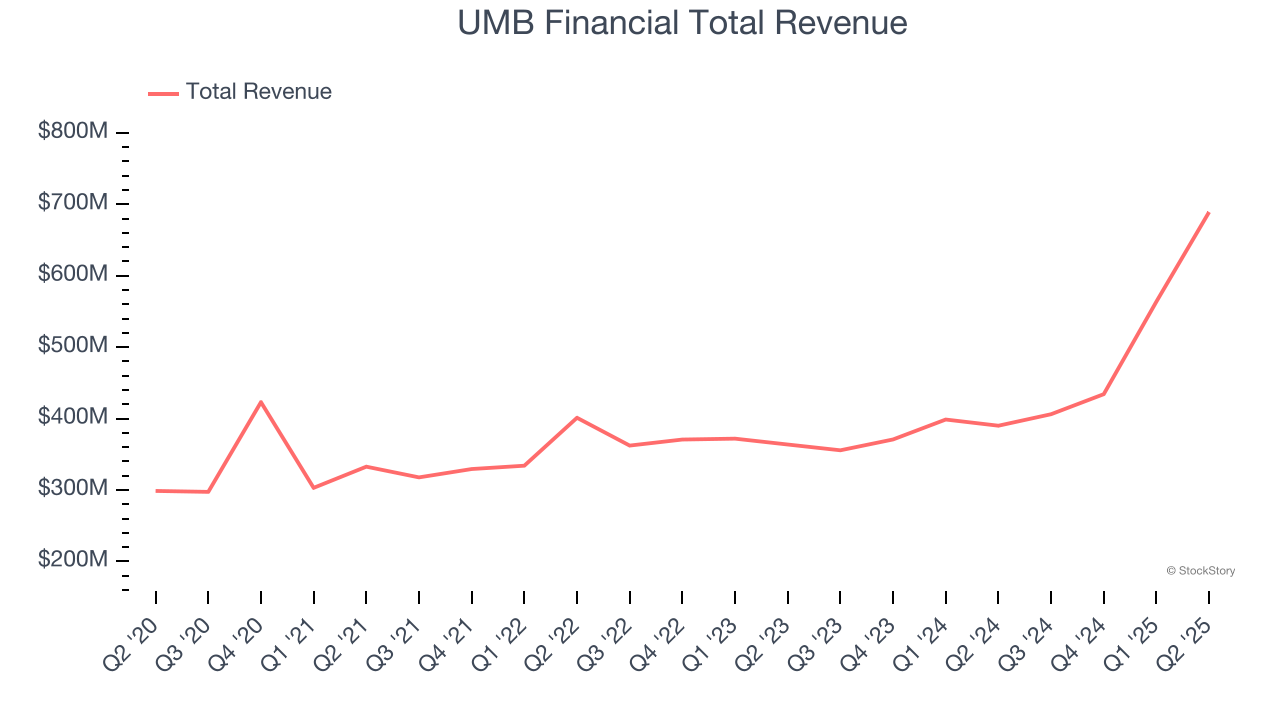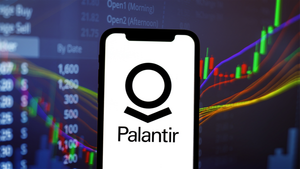
As the Q2 earnings season wraps, let’s dig into this quarter’s best and worst performers in the regional banks industry, including FB Financial (NYSE: FBK) and its peers.
Regional banks, financial institutions operating within specific geographic areas, serve as intermediaries between local depositors and borrowers. They benefit from rising interest rates that improve net interest margins (the difference between loan yields and deposit costs), digital transformation reducing operational expenses, and local economic growth driving loan demand. However, these banks face headwinds from fintech competition, deposit outflows to higher-yielding alternatives, credit deterioration (increasing loan defaults) during economic slowdowns, and regulatory compliance costs. Recent concerns about regional bank stability following high-profile failures and significant commercial real estate exposure present additional challenges.
The 102 regional banks stocks we track reported a satisfactory Q2. As a group, revenues were in line with analysts’ consensus estimates.
In light of this news, share prices of the companies have held steady. On average, they are relatively unchanged since the latest earnings results.
FB Financial (NYSE: FBK)
Founded in 1906 and operating through more than a century of economic cycles, FB Financial (NYSE: FBK) operates FirstBank, providing commercial and consumer banking services across Tennessee, Kentucky, Alabama, and North Georgia.
FB Financial reported revenues of $76.86 million, down 40.1% year on year. This print fell short of analysts’ expectations by 43.5%. Overall, it was a softer quarter for the company with a significant miss of analysts’ revenue estimates and EPS in line with analysts’ estimates.
President and Chief Executive Officer , Christopher T. Holmes stated, “The Company delivered solid operating results in the second quarter with growth in both loans and customer deposits, a healthy net interest margin and managed expense growth, along with strong capital and liquidity positions. Additionally, we repositioned our balance sheet by selling low-yielding securities which will further enhance both our liquidity and margin moving forward. With the momentum of the quarter, the impact of the balance sheet enhancements and the July 1st closing of the Southern States Bancshares, Inc. (“Southern States”) merger, we are well-positioned for the second half of the year.”

FB Financial delivered the weakest performance against analyst estimates and slowest revenue growth of the whole group. Interestingly, the stock is up 19.7% since reporting and currently trades at $58.86.
Is now the time to buy FB Financial? Access our full analysis of the earnings results here, it’s free for active Edge members.
Best Q2: UMB Financial (NASDAQ: UMBF)
With roots dating back to 1913 and a name derived from "United Missouri Bank," UMB Financial (NASDAQ: UMBF) is a financial holding company that provides banking, asset management, and fund services to commercial, institutional, and individual customers.
UMB Financial reported revenues of $689.2 million, up 76.7% year on year, outperforming analysts’ expectations by 8.6%. The business had a stunning quarter with a beat of analysts’ EPS and revenue estimates.

The market seems happy with the results as the stock is up 7.9% since reporting. It currently trades at $118.39.
Is now the time to buy UMB Financial? Access our full analysis of the earnings results here, it’s free for active Edge members.
Weakest Q2: Coastal Financial (NASDAQ: CCB)
Pioneering the intersection of traditional banking and financial technology in the Pacific Northwest, Coastal Financial (NASDAQ: CCB) operates as a bank holding company that provides traditional banking services and Banking-as-a-Service (BaaS) solutions to consumers and businesses.
Coastal Financial reported revenues of $119.4 million, down 11.7% year on year, falling short of analysts’ expectations by 21.5%. It was a disappointing quarter as it posted a significant miss of analysts’ revenue and net interest income estimates.
Interestingly, the stock is up 6.5% since the results and currently trades at $108.09.
Read our full analysis of Coastal Financial’s results here.
Axos Financial (NYSE: AX)
Originally founded as Bank of Internet USA in 1999 before rebranding in 2018, Axos Financial (NYSE: AX) is a diversified financial services company that provides digital banking, securities clearing, and investment advisory solutions to retail and business customers nationwide.
Axos Financial reported revenues of $321.4 million, up 10.5% year on year. This print surpassed analysts’ expectations by 3.4%. Overall, it was a strong quarter as it also recorded an impressive beat of analysts’ revenue estimates and a beat of analysts’ EPS estimates.
The stock is down 1.8% since reporting and currently trades at $83.78.
Read our full, actionable report on Axos Financial here, it’s free for active Edge members.
Independent Bank (NASDAQ: INDB)
Tracing its roots back to 1907 and serving as a financial cornerstone in New England for over a century, Independent Bank Corp. (NASDAQ: INDB) operates as the holding company for Rockland Trust, providing banking, investment, and financial services across Eastern Massachusetts and Rhode Island.
Independent Bank reported revenues of $180.6 million, up 6.1% year on year. This number beat analysts’ expectations by 1.7%. More broadly, it was a satisfactory quarter as it also logged a solid beat of analysts’ net interest income estimates but a narrow beat of analysts’ EPS estimates.
The stock is up 6.8% since reporting and currently trades at $70.07.
Read our full, actionable report on Independent Bank here, it’s free for active Edge members.
Market Update
As a result of the Fed’s rate hikes in 2022 and 2023, inflation has come down from frothy levels post-pandemic. The general rise in the price of goods and services is trending towards the Fed’s 2% goal as of late, which is good news. The higher rates that fought inflation also didn't slow economic activity enough to catalyze a recession. So far, soft landing. This, combined with recent rate cuts (half a percent in September 2024 and a quarter percent in November 2024) have led to strong stock market performance in 2024. The icing on the cake for 2024 returns was Donald Trump’s victory in the U.S. Presidential Election in early November, sending major indices to all-time highs in the week following the election. Still, debates around the health of the economy and the impact of potential tariffs and corporate tax cuts remain, leaving much uncertainty around 2025.
Want to invest in winners with rock-solid fundamentals? Check out our Top 6 Stocks and add them to your watchlist. These companies are poised for growth regardless of the political or macroeconomic climate.
StockStory is growing and hiring equity analyst and marketing roles. Are you a 0 to 1 builder passionate about the markets and AI? See the open roles here.




